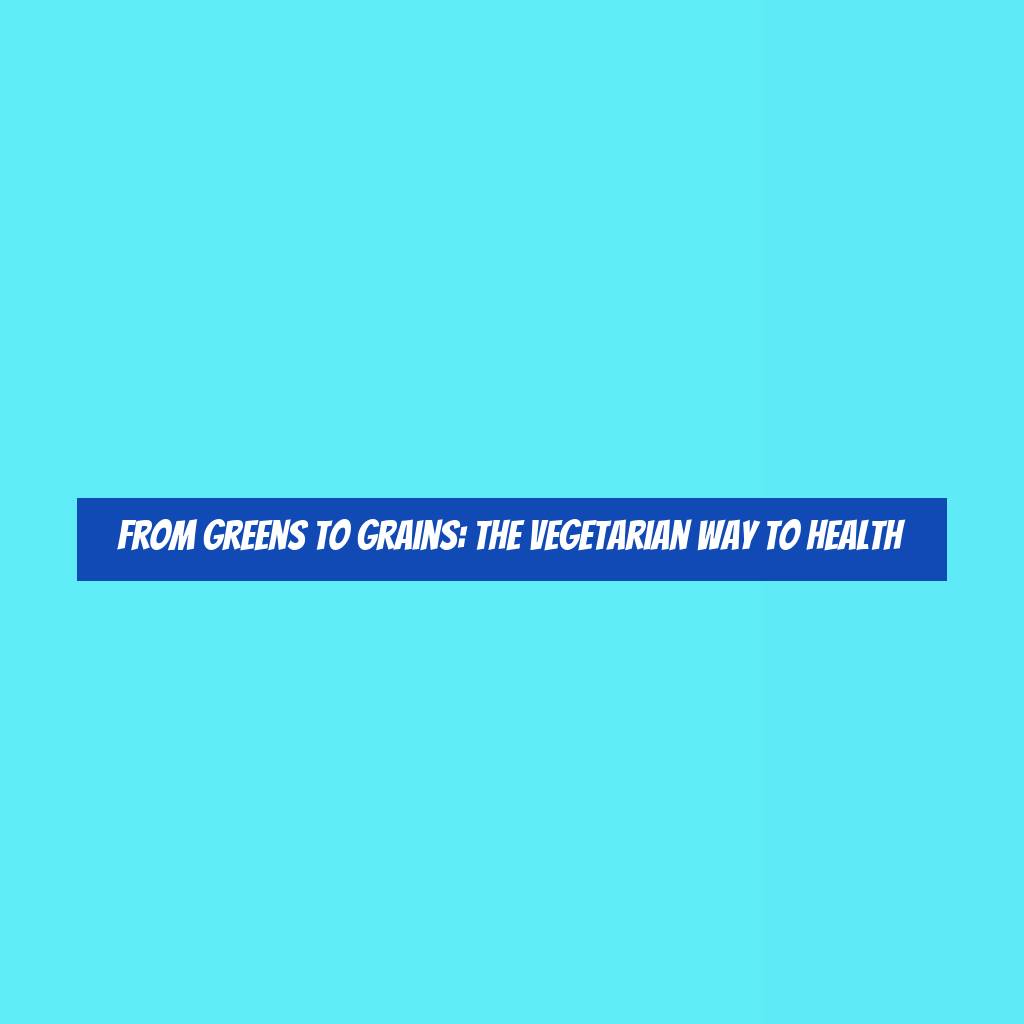From Greens to Grains: The Vegetarian Way to Health
Are you tired of fad diets and unsustainable health trends? ItG??s time to consider a more holistic approach to your well-being.
The path to wellness may not be as complicated as you think. Imagine nourishing your body with nutrient-rich greens and embracing the wholesome goodness of whole grains.
But is a vegetarian diet truly the key to unlocking optimal health? In the following discussion, weG??ll explore the scientific evidence behind the health benefits of vegetarianism and provide practical insights for making this dietary shift a sustainable part of your lifestyle.
The Science Behind Vegetarian Health Benefits
Understanding the science behind the health benefits of a vegetarian diet can provide valuable insight into how plant-based eating positively impacts your overall well-being. When you consume a variety of fruits, vegetables, whole grains, nuts, and seeds, youG??re fueling your body with essential nutrients.
These nutrients, such as fiber, antioxidants, and phytochemicals, contribute to lower cholesterol levels, reduced risk of heart disease, and better weight management. By choosing plant-based proteins like beans, lentils, and tofu, you can still meet your protein needs while reducing your intake of saturated fats and cholesterol found in animal products.
Additionally, the abundance of vitamins and minerals in plant-based foods supports a strong immune system, healthy bones, and improved digestion. Furthermore, the antioxidants in fruits and vegetables help combat inflammation and oxidative stress, which are linked to chronic diseases.
Embracing a vegetarian diet not only benefits your personal health but also has a positive impact on the environment by conserving water and reducing greenhouse gas emissions.
Nutrient-Rich Greens for Optimal Health
For optimal health, incorporating nutrient-rich greens into your diet is essential. Greens such as spinach, kale, and Swiss chard are packed with vitamins, minerals, and antioxidants that are vital for your overall well-being. These greens are excellent sources of vitamin K, which is crucial for bone health and blood clotting. They also provide ample amounts of iron, essential for transporting oxygen throughout your body. Additionally, the high fiber content in greens supports digestive health and helps regulate blood sugar levels.
Including nutrient-rich greens in your meals can also contribute to weight management and reduce the risk of chronic diseases such as heart disease and diabetes. The diverse range of phytonutrients found in greens offers anti-inflammatory and immune-boosting properties. Consuming a variety of greens ensures that you receive a wide spectrum of nutrients, promoting optimal health and vitality.
To maximize the benefits, aim to incorporate a mix of leafy greens into your daily diet, whether through salads, smoothies, or cooked dishes. By prioritizing the inclusion of these nutrient-rich greens, you can take a significant step towards enhancing your overall health.
Embracing Whole Grains for Wellness
Now that youG??ve recognized the importance of nutrient-rich greens for your health, letG??s explore the benefits of embracing whole grains for overall wellness.
Whole grains are an essential component of a healthy vegetarian diet and offer numerous advantages for your well-being.
-
Nutrient Powerhouse: Whole grains are rich in essential nutrients such as fiber, B vitamins, and minerals like iron, magnesium, and selenium. These nutrients play a crucial role in supporting your overall health and vitality.
-
Heart Health: Incorporating whole grains into your diet can contribute to a healthier heart. TheyG??re known to reduce the risk of heart disease, lower cholesterol levels, and regulate blood pressure, promoting cardiovascular well-being.
-
Weight Management: Whole grains can aid in weight management and satiety due to their high fiber content, which helps you feel full for longer periods and may reduce the risk of overeating.
Weight Management on a Plant-Based Diet
If youG??re looking to manage your weight on a plant-based diet, incorporating nutrient-dense foods and being mindful of portion sizes can contribute to your overall success. Whole plant foods such as fruits, vegetables, whole grains, legumes, nuts, and seeds are rich in essential nutrients and fiber, helping you feel satisfied while managing your calorie intake.
When focusing on weight management, itG??s important to emphasize foods with high nutrient density, such as leafy greens, berries, quinoa, and lentils. These foods provide essential vitamins, minerals, and antioxidants while being relatively low in calories.
Additionally, being mindful of portion sizes is crucial. While plant-based foods are generally lower in calories compared to animal products, itG??s still important to be aware of portion control, especially with calorie-dense foods like nuts, seeds, and avocados. Opting for smaller plates and bowls, and taking the time to savor and enjoy your meals can help prevent overeating.
Furthermore, incorporating regular physical activity into your routine can complement your plant-based diet for effective weight management.
Practical Tips for Transitioning to Vegetarianism
Embracing a vegetarian lifestyle allows you to focus on incorporating nutrient-dense foods and practicing mindful portion control, which are essential aspects of effective weight management on a plant-based diet.
Transitioning to vegetarianism can seem daunting, but with the right approach, it can be a smooth and rewarding journey. Here are some practical tips to help you make the switch:
-
Gradual Transition: Start by incorporating more plant-based meals into your diet and gradually reducing your consumption of animal products. This gradual approach can make the transition feel more manageable and sustainable.
-
Experiment with New Recipes: Explore different vegetarian recipes and get creative with plant-based ingredients. This can make the transition more exciting and help you discover new favorite dishes.
-
Seek Support: Connect with other vegetarians or join online communities to seek support and advice. Surrounding yourself with like-minded individuals can provide encouragement and valuable tips for a successful transition.
Conclusion
So, if youG??re looking for a way to improve your health and overall wellness, consider making the switch to a vegetarian diet.
Incorporating nutrient-rich greens and whole grains can provide you with all the essential nutrients your body needs. Not to mention, it can also help with weight management.
With the right approach and practical tips, transitioning to a vegetarian lifestyle can be a positive and beneficial choice for your health.
